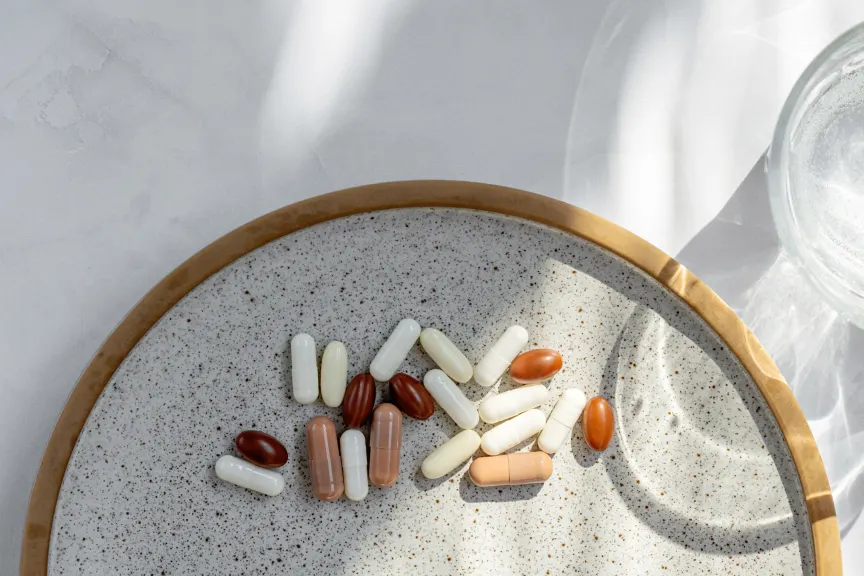Chronic Obstructive Pulmonary Disease (COPD) is a progressive respiratory condition that includes illnesses such as chronic bronchitis and emphysema, affecting millions worldwide. Characterized by breathlessness, coughing, and frequent respiratory infections, COPD is often caused by long-term exposure to irritants such as tobacco smoke, air pollution, or chemical fumes. While there is currently no cure, treatments aim to manage symptoms, slow disease progression, and improve the quality of life for those diagnosed.
Beyond traditional treatments, there is growing interest in the role that nutritional supplements might play in managing COPD symptoms and potentially improving lung health. While supplements are not a replacement for conventional COPD treatment, they may support the body’s ability to fight infections, reduce inflammation, and improve lung function. This article explores various supplements that have shown potential for COPD patients and examines the benefits, risks, and scientific evidence behind their use.
Understanding COPD: Causes and Symptoms
COPD is a chronic, progressive illness where airflow to the lungs becomes obstructed, making it increasingly difficult to breathe. Over time, inflammation and damage to the lung tissue lead to a decrease in elasticity, reducing the lungs’ ability to expand and contract. Common symptoms include:
- Shortness of Breath: Worsens with physical activity and disease progression.
- Chronic Cough: Often produces mucus and may persist for years.
- Frequent Respiratory Infections: Due to reduced lung immunity.
- Wheezing and Chest Tightness: Due to airway obstruction and inflammation.
COPD risk factors include long-term smoking, genetic predisposition, exposure to harmful environmental pollutants, and respiratory infections during childhood. Although COPD can’t be fully reversed, symptom management, lifestyle changes, and targeted therapies can significantly impact the progression of the disease.
Role of Supplements in COPD Management
Since the lungs are vulnerable to oxidative damage and inflammation in COPD, supplements that reduce oxidative stress, support the immune system, or help to manage inflammation may offer added benefits. Nutritional supplements are generally intended to complement, not replace, existing COPD treatments like bronchodilators, corticosteroids, and oxygen therapy.
Chronic Obstructive Pulmonary Disease (COPD) is a progressive lung condition that affects millions worldwide, causing breathing difficulties, frequent respiratory infections, and a reduced quality of life. While there is no cure for COPD, certain dietary supplements can help manage its symptoms, improve lung function, and reduce inflammation. Here’s an in-depth look at specific supplements with potential benefits for people living with COPD, focusing on vitamins, minerals, antioxidants, and herbal remedies.
Vitamins and Their Potential Benefits for COPD
Vitamins play essential roles in immune health, inflammation reduction, and lung function. The following vitamins may have particular benefits for those with COPD.
1. Vitamin D
Role in COPD:
Vitamin D is essential for immune system support and bone health, both of which are critical for COPD patients. Many COPD patients have a deficiency in vitamin D, which has been linked to worsened lung function and increased susceptibility to respiratory infections.
Benefits:
- Enhances immune response, potentially reducing the frequency of respiratory infections.
- Supports lung function by reducing inflammation in the airways.
- Strengthens bones, lowering the risk of fractures in COPD patients who may have reduced mobility.
Sources:
Sun exposure, fatty fish, fortified dairy products, and supplements.
Recommended Dosage:
1,000-2,000 IU per day for COPD patients, depending on deficiency levels and medical guidance.
2. Vitamin C
Role in COPD:
Vitamin C is a powerful antioxidant that protects the lungs from oxidative stress caused by pollution, smoking, and infections. It supports immune health and helps reduce inflammation.
Benefits:
- Helps reduce oxidative damage to lung tissue.
- Enhances immune function, which is crucial for preventing infections in COPD patients.
- Aids in collagen production, supporting tissue repair and lung health.
Sources:
Citrus fruits, strawberries, bell peppers, broccoli, and supplements.
Recommended Dosage:
500-1,000 mg per day, particularly for those who have limited intake from food sources.
3. Vitamin E
Role in COPD:
Vitamin E is another antioxidant that protects cells from damage caused by free radicals. In COPD, oxidative stress is common, and vitamin E may help mitigate this stress, supporting overall lung health.
Benefits:
- Reduces oxidative stress, potentially slowing lung function decline.
- Supports immune function to help prevent infections.
- May improve respiratory symptoms and enhance quality of life for COPD patients.
Sources:
Nuts, seeds, spinach, and supplements.
Recommended Dosage:
15 mg per day for adults.
4. Vitamin A
Role in COPD:
Vitamin A supports lung tissue integrity and plays a role in immune health. Adequate levels may help reduce the risk of infections and aid in maintaining lung health.
Benefits:
- Supports immune health, reducing the risk of respiratory infections.
- Aids in maintaining lung tissue health.
- Helps reduce inflammation and supports cellular repair.
Sources:
Carrots, sweet potatoes, spinach, and liver.
Recommended Dosage:
700-900 mcg per day for adults, but high doses should be avoided as they can be toxic.
Minerals and Their Potential Benefits for COPD
Minerals like magnesium, zinc, and selenium play critical roles in lung function, immune support, and reducing inflammation, making them valuable for COPD patients.
5. Magnesium
Role in COPD:
Magnesium helps relax bronchial muscles, which can make breathing easier in COPD patients. It is also essential for normal muscle and nerve function.
Benefits:
- Relaxes bronchial muscles, which may improve airflow and ease breathing.
- Supports immune health and reduces inflammation.
- May help reduce muscle cramps and discomfort, common in COPD patients.
Sources:
Leafy greens, nuts, whole grains, and supplements.
Recommended Dosage:
300-400 mg per day for adults.
6. Zinc
Role in COPD:
Zinc is essential for immune function and cellular repair. Deficiency in zinc can compromise immune health, making COPD patients more susceptible to infections.
Benefits:
- Boosts immune response to reduce infection risk.
- May improve respiratory function and reduce inflammation.
- Supports wound healing, which may aid in tissue repair in the lungs.
Sources:
Meat, shellfish, legumes, and dairy products.
Recommended Dosage:
8-11 mg per day for adults.
7. Selenium
Role in COPD:
Selenium is a trace mineral that acts as a powerful antioxidant, reducing oxidative stress and inflammation. It may help protect lung tissue from damage and improve overall lung function.
Benefits:
- Reduces oxidative stress, which is beneficial for protecting lung tissue.
- Supports immune health, helping prevent respiratory infections.
- May help slow disease progression by reducing inflammation.
Sources:
Brazil nuts, seafood, and whole grains.
Recommended Dosage:
55 mcg per day for adults.
Antioxidants and Their Potential Benefits for COPD
Antioxidants reduce oxidative stress, which is significant in COPD progression. They help protect lung cells from damage and can alleviate inflammation.
8. N-Acetylcysteine (NAC)
Role in COPD:
NAC is a precursor to glutathione, an antioxidant that protects lung cells. It also acts as a mucolytic agent, helping to clear mucus from the airways.
Benefits:
- Helps reduce mucus build-up, making it easier to breathe.
- Protects lung cells from oxidative damage.
- May improve lung function and reduce flare-ups.
Sources:
Primarily taken as a supplement.
Recommended Dosage:
600-1,200 mg per day, depending on medical guidance.
9. Curcumin
Role in COPD:
Curcumin, the active compound in turmeric, has anti-inflammatory and antioxidant properties. It has shown promise in reducing lung inflammation and improving respiratory health.
Benefits:
- Reduces inflammation in the airways.
- Protects against oxidative damage.
- May alleviate symptoms such as shortness of breath.
Sources:
Turmeric root and supplements.
Recommended Dosage:
500-1,500 mg per day, best taken with black pepper for improved absorption.
10. Omega-3 Fatty Acids
Role in COPD:
Omega-3 fatty acids have anti-inflammatory properties that can be particularly beneficial for COPD patients. They help reduce inflammation in the lungs and improve cardiovascular health, which is often impacted by COPD.
Benefits:
- Reduces lung inflammation and improves breathing.
- Supports heart health, which is important for COPD patients.
- May improve overall respiratory function and quality of life.
Sources:
Fatty fish, flaxseeds, chia seeds, and supplements.
Recommended Dosage:
1,000-2,000 mg per day of EPA and DHA combined.
Herbal Supplements and Their Potential Benefits for COPD
Herbal supplements have been used in traditional medicine for centuries and offer natural support for respiratory health, immune function, and relaxation.
11. Ginseng
Role in COPD:
Ginseng has adaptogenic properties that support energy and immune health. Some studies have shown it may help improve lung function and reduce respiratory infections in COPD patients.
Benefits:
- Supports immune health and reduces infection risk.
- May improve lung function and reduce shortness of breath.
- Helps reduce fatigue, improving energy levels for COPD patients.
Sources:
Available as root extracts and supplements.
Recommended Dosage:
200-400 mg per day.
12. Echinacea
Role in COPD:
Echinacea is commonly used to boost the immune system and may help prevent respiratory infections, which can worsen COPD symptoms.
Benefits:
- Reduces the risk and duration of respiratory infections.
- Supports immune health, helping to prevent COPD exacerbations.
- Has mild anti-inflammatory effects that benefit respiratory health.
Sources:
Typically taken as a supplement, tea, or tincture.
Recommended Dosage:
400-500 mg, up to three times per day.
13. Green Tea
Role in COPD:
Green tea contains antioxidants called catechins, which can reduce inflammation and provide cardiovascular benefits. It also has mild bronchodilatory effects, potentially easing breathing in COPD patients.
Benefits:
- Reduces inflammation and oxidative stress in the lungs.
- May improve respiratory function and airflow.
- Supports heart health and immune function.
Sources:
Available as a drink, capsules, or extract.
Recommended Dosage:
1-3 cups per day or 400-800 mg extract per day.
14. Chamomile
Role in COPD:
Chamomile has mild anti-inflammatory properties and is known for its calming effects, which can help reduce anxiety and promote relaxation for COPD patients.
Benefits:
- Reduces anxiety and improves sleep quality.
- Provides mild anti-inflammatory effects for lung health.
- Supports relaxation, which is beneficial for COPD patients who experience shortness of breath.
Sources:
Available as tea or in supplement form.
Recommended Dosage:
1-2 cups of chamomile tea per day.
15. Lemon Balm
Role in COPD:
Lemon balm is a calming herb that may help reduce stress and promote relaxation. It also has mild antiviral and antioxidant properties.
Benefits:
- Helps reduce stress and anxiety, which can worsen COPD symptoms.
- Provides antioxidant support to protect lung tissue.
- May improve sleep quality and overall well-being.
Sources:
Available as tea, tincture, or in supplement form.
Recommended Dosage:
300-600 mg per day, or 1-2 cups of tea as needed
Incorporating these supplements into a COPD management plan should always be done under the guidance of a healthcare provider, as some may interact with medications or require specific dosages for safety.
Precautions and Considerations for COPD Patients
While supplements can provide added benefits for managing COPD symptoms, they are not a substitute for medical treatment. COPD patients should approach supplements cautiously, as some may interact with medications or have unintended side effects.
- Consult Healthcare Providers: Always consult your healthcare provider before starting any supplement regimen.
- Monitor Dosage: Avoid excessive dosages, as some supplements (like vitamin E and zinc) can have adverse effects at high levels.
- Focus on a Balanced Diet: Supplements are most effective when paired with a nutrient-rich diet. Include fresh fruits, vegetables, lean proteins, and healthy fats.
- Consider Potential Side Effects: Some supplements may cause gastrointestinal distress or interact with other medications. Discuss any potential side effects with your doctor.
Conclusion
For COPD patients, managing symptoms and improving quality of life often involves a multi-faceted approach, which may include medications, lifestyle changes, and in some cases, supplements. While nutritional supplements like vitamin D, omega-3s, NAC, and magnesium show potential in supporting lung function and reducing inflammation, they are not a standalone treatment for COPD.




